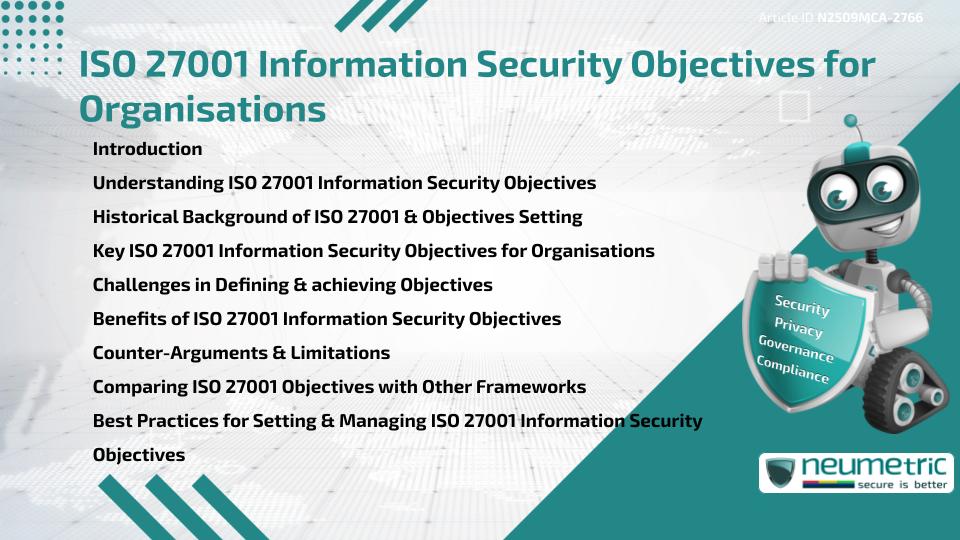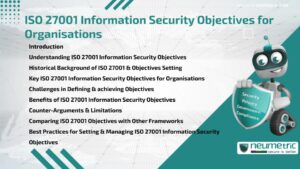Table of Contents
ToggleIntroduction
The ISO 27001 Information Security Objectives are essential goals that guide organisations in protecting data, ensuring compliance & managing Risks. These Objectives serve as benchmarks to measure the effectiveness of an Information Security management system [ISMS]. By establishing ISO 27001 Information Security Objectives, organisations can align security strategies with business needs, enhance resilience & demonstrate accountability to Stakeholders.
Understanding ISO 27001 Information Security Objectives
ISO 27001 Information Security Objectives define what an organisation aims to achieve through its ISMS. They provide direction, clarity & measurable outcomes for Information Security practices. Objectives may vary depending on the organisation’s size, industry & Risk profile, but they all support the Core Principles of confidentiality, integrity & availability of information.
Historical Background of ISO 27001 & Objectives Setting
ISO 27001 was first published in 2005 as the leading international Standard for Information Security management. From its inception, the Standard emphasised the need for measurable Objectives to evaluate the success of an ISMS. Updates in 2013 & 2022 reinforced this requirement, encouraging organisations to integrate Objectives into broader business strategies & Continuous Improvement processes.
Key ISO 27001 Information Security Objectives for Organisations
Common ISO 27001 Information Security Objectives include:
- Confidentiality: Preventing unauthorized access to Sensitive Information.
- Integrity: Ensuring data remains accurate, consistent & trustworthy.
- Availability: Guaranteeing that information is accessible when needed.
- Regulatory Compliance: Meeting legal, contractual & regulatory requirements.
- Risk reduction: Minimizing the Likelihood & Impact of Security Incidents.
- Awareness & training: Educating Employees to follow security Best Practices.
- Continuous Improvement: Regularly updating controls & processes to adapt to emerging Threats.
Challenges in Defining & achieving Objectives
Setting ISO 27001 Information Security Objectives can be challenging. Organisations often struggle with balancing ambitious goals against available resources. Measuring intangible Objectives, such as Employee awareness, can also be difficult. Additionally, misalignment between security Objectives & business priorities may reduce effectiveness.
Benefits of ISO 27001 Information Security Objectives
Despite challenges, ISO 27001 Information Security Objectives offer significant benefits:
- Provide measurable benchmarks for Security Performance.
- Strengthen Stakeholder confidence in the organisation’s security posture.
- Help prioritise resources toward critical security areas.
- Reduce Risks of breaches, penalties & reputational damage.
- Support a culture of accountability & Continuous Improvement.
Counter-Arguments & Limitations
Some critics argue that focusing heavily on predefined Objectives may lead to a “checklist mentality,” where organisations meet goals superficially without addressing deeper Risks. Others highlight that Objectives alone cannot prevent breaches. While these arguments are valid, Objectives are meant to guide, not replace, broader Risk Management & proactive Security Measures.
Comparing ISO 27001 Objectives with Other Frameworks
Frameworks such as NIST Cybersecurity Framework & COBIT also emphasise goal-setting. However, the ISO 27001 Information Security Objectives are unique because they are embedded into a certifiable ISMS, providing global recognition. Unlike other frameworks, ISO 27001 requires organisations to document, monitor & review Objectives regularly as part of certification.
Best Practices for Setting & Managing ISO 27001 Information Security Objectives
To implement effective ISO 27001 Information Security Objectives, organisations should:
- Ensure Objectives are specific, measurable, achievable, relevant & time-bound [SMART].
- Align Objectives with overall business goals & Risk appetite.
- Involve cross-functional teams in defining Objectives.
- Monitor progress using key performance indicators [KPIs].
- Review & update Objectives regularly as Threats & business needs evolve.
Conclusion
The ISO 27001 Information Security Objectives provide organisations with clear direction for managing Risks & safeguarding information assets. By defining, monitoring & improving these Objectives, businesses can strengthen compliance, build trust & enhance resilience in today’s digital environment.
Takeaways
- ISO 27001 Information Security Objectives guide the effectiveness of an ISMS.
- Objectives address confidentiality, integrity, availability & compliance.
- Challenges include balancing resources & measuring intangible goals.
- Benefits include Risk reduction, accountability & Stakeholder trust.
FAQ
What are ISO 27001 Information Security Objectives?
They are measurable goals that guide organisations in protecting information & ensuring compliance under ISO 27001.
Why are these Objectives important?
They provide benchmarks for Security Performance & demonstrate accountability to Stakeholders.
What are examples of common Objectives?
Examples include ensuring confidentiality, reducing Risks, meeting compliance & training Employees.
How often should Objectives be reviewed?
They should be reviewed regularly, at least annually or after major organisational changes.
How do these Objectives differ from other Frameworks?
Unlike other Frameworks, ISO 27001 Objectives are part of a certifiable Standard & must be documented & monitored.
Can small organisations set ISO 27001 Information Security Objectives?
Yes, Objectives can be scaled according to the size & resources of the organisation.
References
- ISO – Information Security Standards
- NIST – Cybersecurity Framework
- Council of Europe – Data Protection and Privacy
Need help for Security, Privacy, Governance & VAPT?
Neumetric provides organisations the necessary help to achieve their Cybersecurity, Compliance, Governance, Privacy, Certifications & Pentesting needs.
Organisations & Businesses, specifically those which provide SaaS & AI Solutions in the Fintech, BFSI & other regulated sectors, usually need a Cybersecurity Partner for meeting & maintaining the ongoing Security & Privacy needs & requirements of their Enterprise Clients & Privacy conscious Customers.
SOC 2, ISO 27001, ISO 42001, NIST, HIPAA, HECVAT, EU GDPR are some of the Frameworks that are served by Fusion – a SaaS, multimodular, multitenant, centralised, automated, Cybersecurity & Compliance Management system.
Neumetric also provides Expert Services for technical security which covers VAPT for Web Applications, APIs, iOS & Android Mobile Apps, Security Testing for AWS & other Cloud Environments & Cloud Infrastructure & other similar scopes.
Reach out to us by Email or filling out the Contact Form…





